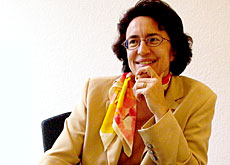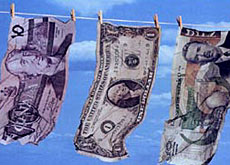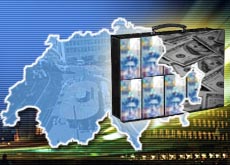Anti-money laundering chief defends her record

Switzerland’s Money Laundering Control Authority (MLCA) has come in for regular criticism since its inception in 1998.
But three years after taking control of the organisation, Dina Balleyguier told swissinfo that it had succeeded in “weeding out the lawbreakers”.
The MLCA, which is charged with monitoring the non-banking sector, investigated 245 financial institutions last year – a 57 per cent rise on the previous year.
The federal body says its increased workload is proof that Swiss anti-money laundering systems are working.
The government maintains that existing legislation has made money laundering in Switzerland all but impossible.
But the Financial Action Task Force (FATF) took Switzerland to task last year for failing to close loopholes which allow gem and precious metal traders to launder money.
The Swiss government has set up a working group to study the FATF’s recommendations.
swissinfo: In 2003 you banned seven financial intermediaries. That seems to be a very low number.
Dina Balleyguier: If you consider that we conduct hundreds of investigations to find out if an individual or a company has broken the law, I would say the fact that we have to sanction so few of them means we have already weeded out the lawbreakers.
swissinfo: So you don’t agree with legal experts who say that your fight against money laundering is doomed?
D.B.: I don’t think you should use the number of official sanctions as an indicator of how much money laundering is going on Switzerland.
When we ban an intermediary, in many cases it is because they are operating without the right authorisation. This doesn’t mean somebody is indulging in money laundering.
We have discovered few cases of money laundering, and I am convinced this is because due diligence rules are being applied. Financial intermediaries are doing their homework and not accepting business from money launderers.
swissinfo: How do you run your investigations?
D.B.: We carry out a lot of investigative work. We consult the commercial registry, scan the press and get tip-offs from local authorities and individuals. We check all of these leads and we are confident we can uncover any illegal activities.
swissinfo: Money laundering legislation has been criticised for not covering all eventualities. Property companies and gem traders, as well as solicitors and lawyers, aren’t taken into account.
D.B.: So far, over 1,000 solicitors and lawyers have registered as financial intermediaries and signed up with a self-regulatory organisation.
It’s true, though, that property businesses, small precious metal traders and art dealers are not covered by our legislation and could launder money. A working group is considering if the FATF recommendations should be applied and how.
swissinfo: How important is your collaboration with the banking commission and authorities abroad?
D.B.: We work very closely with the banking commission. We inform each other of the latest developments and our employees are regularly in touch with one another. Within the confines of our privacy protection laws, we also share data.
We also collaborate with foreign authorities and exchange information. This is, however, rare since the banking commission is responsible for international exchanges.
swissinfo-interview: Andreas Keiser
The MLCA monitors the non-banking sector, such as financial advisers, commodity traders and other brokers.
It ensures that so-called “self-regulatory organisations” oblige their members to maintain standards under money-laundering laws.
Its job is to ensure financial institutions conduct due diligence and “know your customer” checks.

In compliance with the JTI standards
More: SWI swissinfo.ch certified by the Journalism Trust Initiative




You can find an overview of ongoing debates with our journalists here. Please join us!
If you want to start a conversation about a topic raised in this article or want to report factual errors, email us at english@swissinfo.ch.